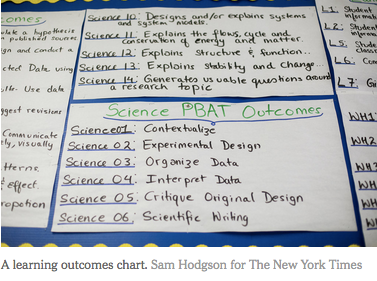Moheeb is part of a new program that is challenging the way teachers and students think about academic accomplishments, and his school is one of hundreds that have done away with traditional letter grades inside their classrooms. At M.S. 442, students are encouraged to focus instead on mastering a set of grade-level skills, like writing a scientific hypothesis or identifying themes in a story, moving to the next set of skills when they have demonstrated that they are ready. In these schools, there is no such thing as a C or a D for a lazily written term paper. There is no failing. The only goal is to learn the material, sooner or later.
For struggling students, there is ample time to practice until they get it. For those who grasp concepts quickly, there is the opportunity to swiftly move ahead. The strategy looks different from classroom to classroom, as does the material that students must master. But in general, students work at their own pace through worksheets, online lessons and in small group discussions with teachers. They get frequent updates on skills they have learned and those they need to acquire.
Mastery-based learning, also known as proficiency-based or competency-based learning, is taking hold across the country. Vermont and Maine have passed laws requiring school districts to phase in the system. New Hampshire is adopting it, too, and piloting a statewide method of assessment that would replace most standardized tests. Ten school districts in Illinois, including Chicago’s, are testing the approach. In 2015, the Idaho State Legislature approved 19 incubator programs to explore the practice.




